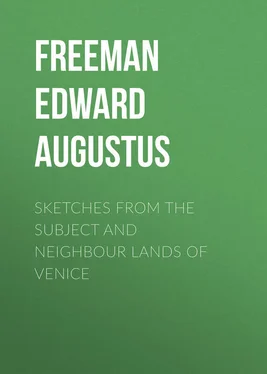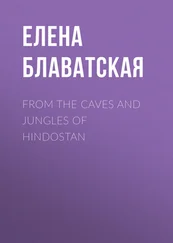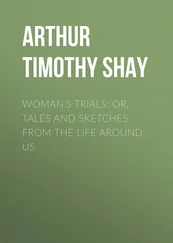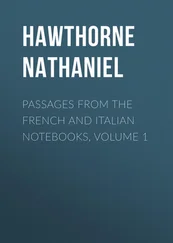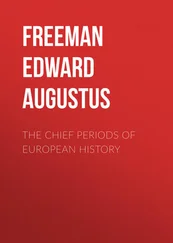Edward Freeman - Sketches from the Subject and Neighbour Lands of Venice
Здесь есть возможность читать онлайн «Edward Freeman - Sketches from the Subject and Neighbour Lands of Venice» — ознакомительный отрывок электронной книги совершенно бесплатно, а после прочтения отрывка купить полную версию. В некоторых случаях можно слушать аудио, скачать через торрент в формате fb2 и присутствует краткое содержание. Жанр: foreign_antique, foreign_prose, Путешествия и география, на английском языке. Описание произведения, (предисловие) а так же отзывы посетителей доступны на портале библиотеки ЛибКат.
- Название:Sketches from the Subject and Neighbour Lands of Venice
- Автор:
- Жанр:
- Год:неизвестен
- ISBN:нет данных
- Рейтинг книги:3 / 5. Голосов: 1
-
Избранное:Добавить в избранное
- Отзывы:
-
Ваша оценка:
- 60
- 1
- 2
- 3
- 4
- 5
Sketches from the Subject and Neighbour Lands of Venice: краткое содержание, описание и аннотация
Предлагаем к чтению аннотацию, описание, краткое содержание или предисловие (зависит от того, что написал сам автор книги «Sketches from the Subject and Neighbour Lands of Venice»). Если вы не нашли необходимую информацию о книге — напишите в комментариях, мы постараемся отыскать её.
Sketches from the Subject and Neighbour Lands of Venice — читать онлайн ознакомительный отрывок
Ниже представлен текст книги, разбитый по страницам. Система сохранения места последней прочитанной страницы, позволяет с удобством читать онлайн бесплатно книгу «Sketches from the Subject and Neighbour Lands of Venice», без необходимости каждый раз заново искать на чём Вы остановились. Поставьте закладку, и сможете в любой момент перейти на страницу, на которой закончили чтение.
Интервал:
Закладка:
UDINE AND CIVIDALE
Ought the antiquarian traveller who has taken up his quarters at Udine and has thence made an expedition to Cividale to counsel his fellow-inquirers to follow his example in so doing or not? The answer to this question may be well made largely to depend on the state of the weather. It would be dangerous to say, from an experience of two visits only, that at Udine and Cividale it always either rains or has very lately rained; but those are the only two conditions in which we can speak of those places from personal knowledge. Now it is wonderful how a heavy rain damps the zeal of the most inquiring spirit, especially if he be carrying on his inquiries by himself. If he has companions, a good deal of wet may be shaken off by the process of talking and laughing at the common bad luck. If he be alone, every drop sticks; he has nothing to do but to grumble, and he has nobody to listen to his grumblings but himself. The land may be beautiful, but its beauties are half hid; the buildings may have the most taking outlines, but it is impossible to make a drawing of them. Even interiors lose their cheerfulness; the general gloom makes half their details invisible; and his own depression of spirit makes the inquirer less able than usual to understand and appreciate what he can see. Udine and Cividale on a fine day are something quite unlike Udine and Cividale in the rain. But even in this more cheerful state of things, when the rain has to be spoken of in the past tense, it may happen that the past puts serious difficulties in the way of the enjoyment of the present. Cividale is undoubtedly more pleasant and more profitable to see when the rain is past than when the rain is actually falling. But then, to judge from our two experiences, Cividale is easier to get at while the rain is actually falling than when it has ceased to fall. What in the one state of things is the half-dry ghiara of an Alpine stream becomes a flood covering the road for no small distance, and suggesting, to all but the most zealous, the thought of turning back. It is only those for whom the attractions of the spot which once was the Forum Julii are strong indeed, who will pluck up heart to go on when their carriage has sometimes to be helped on by men who are used to wade through the flood, or else is forced to leave what should have been the high road for a narrow and difficult path across the fields. It is well to record these things, that those who stay at home may be put in mind that, even in perfectly civilized lands, topographical knowledge is not always to be got without going to some little trouble in the search after it. We have seen Udine and Cividale wet, and we have seen them dry, but then it was when they had been wet only a very short time before. We are tempted to think that we might understand them better at some time when the rainfall was neither of the present nor of the very recent past.
One thing however is certain, that, wet or dry, not many Englishmen make the experiment of trying to find out what this corner of Italy may have to show. Not an English name, save that of one specially famous and adventurous traveller, was to be seen in the visitors' book, either in Albergo dell' Italia at Udine or in the Museum at Cividale. The true traveller is always in a doubtful state of mind when he finds a place of interest neglected by his own countrymen. On the one hand he is personally relieved, as being set free from the gabble of English tourists at tables d'hôte and the like. But how far ought he to proclaim to the world the merits of the place which he has found out for himself? How can he draw the line, so as to lead travellers to come, without holding out the least inducement to mere tourists? But perhaps the danger is not great; tourists will go only where it is the fashion to go, and the historical traveller must not think of himself more highly than he ought to think or fancy that it is for such as he to create a fashion.
We will suppose then that our traveller has started from Treviso, and has reached the frontier town of Italy in the modern sense of the name. We have seen that the existence of the place in Roman times under the name of Vedinum can be proved and no more. The importance and history of Udine, Utinum , are wholly mediæval. It takes the place of Forum Julii as the capital of Friuli the district which keeps the name which has passed away from the city. It is one of the eccentricities of nomenclature that the other Forum Julii in southern Gaul has kept its name, but in the still more corrupted shape of Fréjus . The new head of the Venetian borderland – Venetia in the older sense – went through the usual course of the neighbouring cities with one feature peculiar to itself. Not a patriarchal see, Udine was a patriarchal capital, the capital of the patriarchs of Aquileia in that temporal character which for a long while made the bishops of the forsaken city the chief princes of that corner of Italy.
Like Treviso, but somewhat later, Udine had to undergo a Hungarian siege, when the Magyar crown had passed by marriage from the house of Anjou to the house of Luxemburg. But we may mark how the different powers which had something to do with the lands with which we are concerned are already beginning to gather from the same hands. Lewis, the enemy of Treviso in 1356, purely western in origin, was purely eastern in power – King of Hungary and of the lands round about Hungary, King of Poland by a personal union. Siegmund, the enemy of Udine in 1411, was already King of Hungary, Margrave of Brandenburg also, in days when, as Hungary had nothing to do with Austria, so Brandenburg had nothing to do with Prussia. He was already chosen but not crowned King of the Romans; he was to be, before he had done, King of Bohemia, reformer of the Church, and Emperor, last crowned Emperor not of the Austrian house. Presently the city passed away from the rule of the patriarchs, but it could hardly be said to pass from a spiritual to a temporal lord when it came under the direct superiority of the Evangelist and his Lion. In the war of the League of Cambray it passed for a moment into the hands of an Austrian Archduke, but one who wore the crown of Aachen, and bore the titles of Rome without her crown. The first momentary master saw from the German Austria that Udine was Maximilian, King of Germany and Emperor-elect. In the eighteenth century the patriarchs of Aquileia had become harmless indeed, so harmless that their dignity could be altogether swept away, and their immediate province divided between the two new archbishoprics of Udine and Gorizia. Thus Udine, having once been the temporal seat of an ecclesiastical prince of the highest rank, came, as a subject city, to hold the highest ecclesiastical rank short of that which was swept away to make room for its elevation.
Udine is one of those places which keep fortifications of what we may call the intermediate period, what, in this part of the world, is specially the Venetian period. Such walls stand removed alike from those which, even when not Roman in date, closely follow the Roman type of defences, and from fortifications of the purely modern kind. The walls of Udine are well preserved and defended with ditches, and, as they fence in a large space and as there is comparatively little suburb, they form a prominent feature in the aspect of the town. Within the town, towering over every other object, is the castle or citadel, as unpicturesque a military structure as can be conceived, but perched on a huge mound, like so many of the castles of our own land. Here is work for Mr. Clark. Is the mound natural or artificial? Tradition says that it was thrown up by Attila, that he might stand on it and see the burning of Aquileia. Legendary as such a tale is on the face of it, it may perhaps be taken as some traditional witness to the artificial nature of the mound. It would be dangerous to say anything more positively without minute knowledge both of the geology and of the præ-historic antiquities of Venetia; but analogy always suggests that such mounds are artificial, or at least largely improved by art. Anyhow there the mound is, an earthwork which, if artificial it be, the Lady of the Mercians herself need not have been ashamed of.
Читать дальшеИнтервал:
Закладка:
Похожие книги на «Sketches from the Subject and Neighbour Lands of Venice»
Представляем Вашему вниманию похожие книги на «Sketches from the Subject and Neighbour Lands of Venice» списком для выбора. Мы отобрали схожую по названию и смыслу литературу в надежде предоставить читателям больше вариантов отыскать новые, интересные, ещё непрочитанные произведения.
Обсуждение, отзывы о книге «Sketches from the Subject and Neighbour Lands of Venice» и просто собственные мнения читателей. Оставьте ваши комментарии, напишите, что Вы думаете о произведении, его смысле или главных героях. Укажите что конкретно понравилось, а что нет, и почему Вы так считаете.
